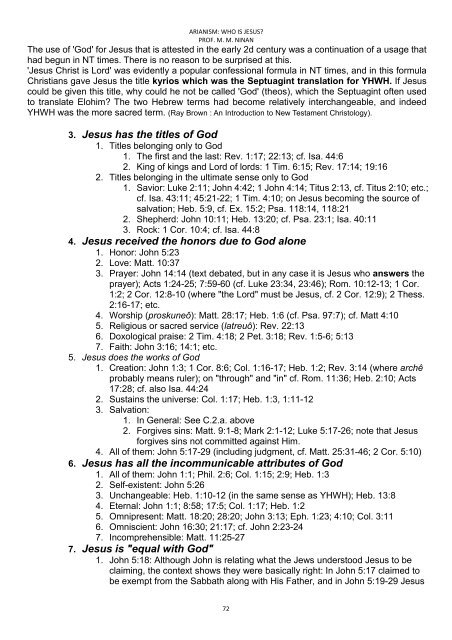Arius
You also want an ePaper? Increase the reach of your titles
YUMPU automatically turns print PDFs into web optimized ePapers that Google loves.
ARIANISM: WHO IS JESUS?<br />
PROF. M. M. NINAN<br />
The use of 'God' for Jesus that is attested in the early 2d century was a continuation of a usage that<br />
had begun in NT times. There is no reason to be surprised at this.<br />
'Jesus Christ is Lord' was evidently a popular confessional formula in NT times, and in this formula<br />
Christians gave Jesus the title kyrios which was the Septuagint translation for YHWH. If Jesus<br />
could be given this title, why could he not be called 'God' (theos), which the Septuagint often used<br />
to translate Elohim? The two Hebrew terms had become relatively interchangeable, and indeed<br />
YHWH was the more sacred term. (Ray Brown : An Introduction to New Testament Christology).<br />
3. Jesus has the titles of God<br />
1. Titles belonging only to God<br />
1. The first and the last: Rev. 1:17; 22:13; cf. Isa. 44:6<br />
2. King of kings and Lord of lords: 1 Tim. 6:15; Rev. 17:14; 19:16<br />
2. Titles belonging in the ultimate sense only to God<br />
1. Savior: Luke 2:11; John 4:42; 1 John 4:14; Titus 2:13, cf. Titus 2:10; etc.;<br />
cf. Isa. 43:11; 45:21-22; 1 Tim. 4:10; on Jesus becoming the source of<br />
salvation; Heb. 5:9, cf. Ex. 15:2; Psa. 118:14, 118:21<br />
2. Shepherd: John 10:11; Heb. 13:20; cf. Psa. 23:1; Isa. 40:11<br />
3. Rock: 1 Cor. 10:4; cf. Isa. 44:8<br />
4. Jesus received the honors due to God alone<br />
1. Honor: John 5:23<br />
2. Love: Matt. 10:37<br />
3. Prayer: John 14:14 (text debated, but in any case it is Jesus who answers the<br />
prayer); Acts 1:24-25; 7:59-60 (cf. Luke 23:34, 23:46); Rom. 10:12-13; 1 Cor.<br />
1:2; 2 Cor. 12:8-10 (where "the Lord" must be Jesus, cf. 2 Cor. 12:9); 2 Thess.<br />
2:16-17; etc.<br />
4. Worship (proskuneô): Matt. 28:17; Heb. 1:6 (cf. Psa. 97:7); cf. Matt 4:10<br />
5. Religious or sacred service (latreuô): Rev. 22:13<br />
6. Doxological praise: 2 Tim. 4:18; 2 Pet. 3:18; Rev. 1:5-6; 5:13<br />
7. Faith: John 3:16; 14:1; etc.<br />
5. Jesus does the works of God<br />
1. Creation: John 1:3; 1 Cor. 8:6; Col. 1:16-17; Heb. 1:2; Rev. 3:14 (where archê<br />
probably means ruler); on "through" and "in" cf. Rom. 11:36; Heb. 2:10; Acts<br />
17:28; cf. also Isa. 44:24<br />
2. Sustains the universe: Col. 1:17; Heb. 1:3, 1:11-12<br />
3. Salvation:<br />
1. In General: See C.2.a. above<br />
2. Forgives sins: Matt. 9:1-8; Mark 2:1-12; Luke 5:17-26; note that Jesus<br />
forgives sins not committed against Him.<br />
4. All of them: John 5:17-29 (including judgment, cf. Matt. 25:31-46; 2 Cor. 5:10)<br />
6. Jesus has all the incommunicable attributes of God<br />
1. All of them: John 1:1; Phil. 2:6; Col. 1:15; 2:9; Heb. 1:3<br />
2. Self-existent: John 5:26<br />
3. Unchangeable: Heb. 1:10-12 (in the same sense as YHWH); Heb. 13:8<br />
4. Eternal: John 1:1; 8:58; 17:5; Col. 1:17; Heb. 1:2<br />
5. Omnipresent: Matt. 18:20; 28:20; John 3:13; Eph. 1:23; 4:10; Col. 3:11<br />
6. Omniscient: John 16:30; 21:17; cf. John 2:23-24<br />
7. Incomprehensible: Matt. 11:25-27<br />
7. Jesus is "equal with God"<br />
1. John 5:18: Although John is relating what the Jews understood Jesus to be<br />
claiming, the context shows they were basically right: In John 5:17 claimed to<br />
be exempt from the Sabbath along with His Father, and in John 5:19-29 Jesus<br />
72

















